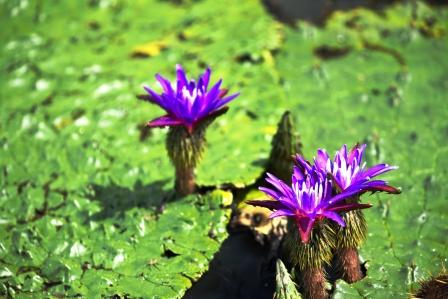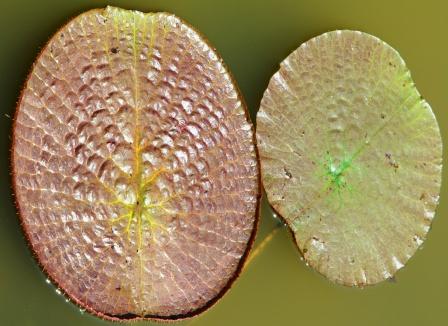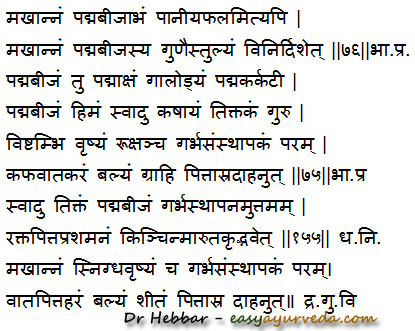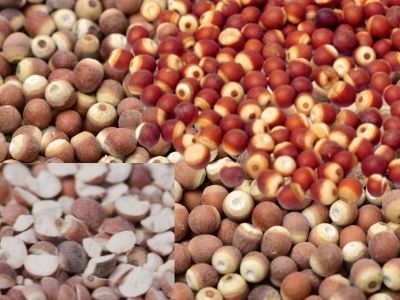Fox nut – Euryale ferox Uses, Dose, Side Effects, Research
Fox nut (Lotus seed, Makhana) is used both as food and medicine in Ayurveda and Chinese systems. It is indicated in gastritis, bleeding disorders such as nasal bleeding etc. Its seeds are rich in nutrition and used as part of food. It is called Makhanna and Ankhalodya in Sanskrit.
Botanical name- Euryale ferox Salisb
Family- Nymphaeaceae (Kamala kula)
Table of Contents
Vernacular names
Names in different languages:
English name- Fox nut
Hindi name- Makhana
Punjabi name- Jaivar
Telugu name- Melluni padmamu
Bengali name – Makhana
Punjabi name – Jaivar
Marathi name – Mane
Gujarati name – Makhana
Urdu name – Kanta Padm
Manipuri name – Thangjing
Japanee name – Onibas, Onibasu
Nikori – Assamese
Chinese name – qiàn shí

Sanskrit Synonyms
Makhanna – Used in Yajna, Homa – Hindu spiritual practices
Ankhalodya – found in ponds
Padma Beejabha – seeds resemble to those of lotus,
Paaneeyaphala – fruits found in ponds
Classical categorisation
Bhavaprakasha – Amradi Phalavarga

Chemical constituents, distribution
Euryale ferox Chemical constituents
Amino acid composition of the seed protein has been reported (J. food Sci. Technol. 1985,22,293)
Distribution: Found in ponds of Bihar and Bengal regions

Medicinal properties
Makhana medicinal Properties:
Guna (qualities) – Guru (heaviness), Snigdha (unctuousness)
Rasa (taste) – Madhura (sweet), Kashaya – astringent, bitter – Tikta
Vipaka- Madhura – Undergoes sweet taste conversion after digestion
Veerya – Sheeta – cold potency
Effect on Tridosha – Balances Vata and Pitta Dosha.
Part used, dosage
Part used: seeds
Dosage: 5-20 g
How to consume?
In Punjab and Bihar region, Fox nut seeds are roasted, which makes them blossom like popcorn. It is then added with oil and pepper and consumed.
Its sweet porridge – Mahana kheer (Payasa), Yogurt dish – Rayta are also prepared.
Chinese people prepare soup from its seeds, by boiling it with other ingredients.
Sanskrit verse

Health benefits
Euryale ferox health benefits:
Vishtambhi – Causes constipation
Vrushya – aphrodisiac, improves vigor
Garbha Samsthapaka – ensures safe pregnancy
Balya – improves strength and immunity
Vrushya – aphrodisiac, improves vigour
Grahi – absorbent, useful in diarrhea, IBS
Kinchit Marutakrut – slightly increases Vata Dosha.
Snigdha – unctuous, oily
Indications
Indicated in:
Pittasra – Raktapitta –Bleeding disorders such as nasal bleeding, heavy periods, etc.
Daha – burning sensation, as in gastritis, neuropathy, burning sensation in eyes etc.

Side effects, research
Side effects:
It is not indicated in people with bloating and constipation.
It can be used during pregnancy and lactation period and in children.
Research:
Anti oxidant activity of seed extract – Total extracts (IC50 5.6 microg/ml) showed relatively high level radical scavenging activity toward 1, 1-diphenyl-2-picrylhydrazyl (DPPH) and also enhanced viability of Chinese hamster lung fibroblast (V79-4) cells under exposure to oxidative agents. Upon further fractionation, the highest levels of DPPH radical scavenging and lipid peroxidation inhibitory activities were found in the ethyl acetate and butanol fractions.
Phyto-chemical screening and anti fungal activity
Interaction with medicines, supplements
Can this be used while taking Homeopathic medicine?
Yes. This product does not react with homeopathic medicine.
Can this medicine be continued while taking supplements like multivitamin tablets, Omega 3 fatty acids etc?
Yes. Generally, this product goes well with most dietary supplements. However, if you are taking more than one product per day, please consult your doctor for an opinion.
With western
medicines
Seek your
doctor’s advice if you are taking this product along with other western
(allopathic / modern) medicines. Some Ayurvedic herbs can interact with modern
medicine.
If both Ayurvedic and allopathic medicines are advised together, then it is
best to take Allopathic medicine first, wait for 30 minutes and then take the
Ayurvedic medicine.
Systemic Action
Circulatory system – Indicated in bleeding disorders
Reproductive system – Sukrajanana, Sukrasthambaka, Prajasthapaka (Increases sperm count, helps for consumption and retain the pregnancy). Also indicated in Post delivery complications.
Tapakrama – Indicated in Fever (jirnajvara)
Satmikarana – Balya, Brimhana, Dahaprasamana ( Strengthens the body, Cure burning sensation, Nourishing)









6 comments on “Fox nut – Euryale ferox Uses, Dose, Side Effects, Research”
Rahul
Dear Dr Hebbar,
The sanskrit verse says its tikta and kashay along with madhur, but you have just mentioned madhura rasa. Am I misinterpreting the sanskrit text?
Regards,
Rahul
Dr J V Hebbar MD(Ayu)
Thanks. Updated.
Rahul
One more confusion sir. 2nd verse says its ruksha while fourth says its snigdha. How does one reconciliate such differences from two different ayurvedic texts?
Thanks again and regards sir!
Dr J V Hebbar MD(Ayu)
Bhavaprakasha’s opinion outweighs that of Dravya Guna Vijnana.
T Vijayalakshmi
If I eat 7 to 8 pieces of makahana, can it cause constipation? If I roast it in oil and sprinkle some pepper, will it still have side effects?
Dr J V Hebbar MD(Ayu)
Yes.